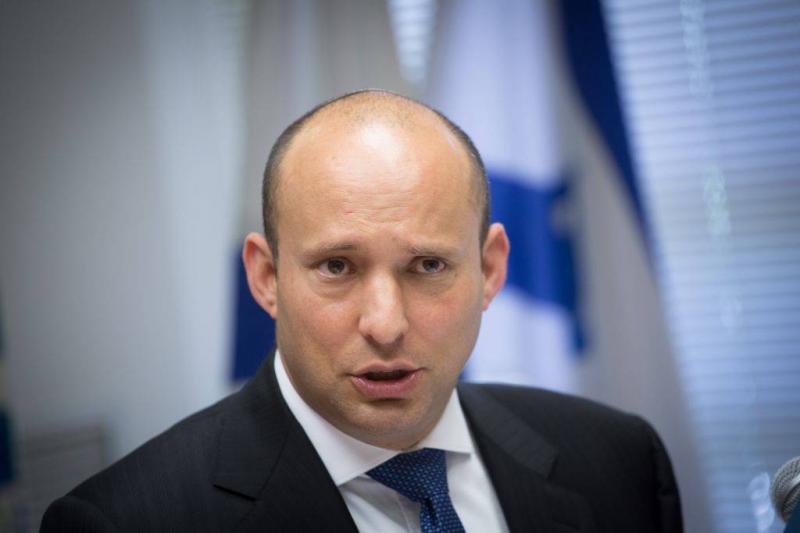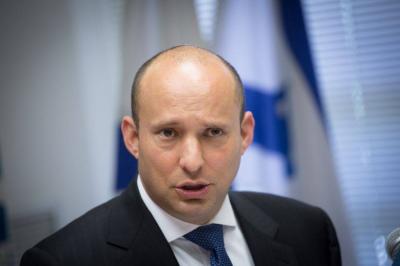The new Israeli government, which took the oath on Sunday, consists of a mix of political parties that share little in common other than the desire to oust veteran right-wing Prime Minister Benjamin Netanyahu. The coalition stretches from far-left to far-right, including, for the first time, a small Islamic faction representing the Arab minority in Israel. The government is expected to focus primarily on economic and social issues rather than risking exposure of internal divisions by attempting to address major political matters like the Israeli-Palestinian conflict. Here are the individuals leading the new government:
**Naftali Bennett - Prime Minister**
Bennett leads the far-right nationalist Yamina party that supports Jewish settlements in the occupied West Bank. He made a fortune in Israel's high-tech sector before entering politics in 2013. He has previously served in Netanyahu-led governments and most recently held the position of Minister of Defense. Bennett now says he joins the opposition to save the country from a period of political turmoil that could lead to a fifth election within a little over two years. His plan to annex most of the West Bank seems unfeasible considering his new partners. He also opposes the establishment of an independent Palestinian state. Under the coalition government formation agreement, Bennett will serve as Prime Minister for two years before being succeeded by Yair Lapid. He will be the first leader of Israel to wear the kippah traditionally worn by Orthodox Jews.
**Yair Lapid - Minister of Foreign Affairs**
Lapid heads the center-left Yesh Atid party and was the main architect of the new government. Although his party is the largest in the coalition, he agreed to share power with Bennett to ensure a parliamentary majority. He resigned from his job as a television broadcaster in 2012 and formed his own party to fulfill his promise to alleviate the financial pressures on the middle class. He seeks to end many of the privileges enjoyed by ultra-Orthodox Jews that are funded by the state, a long-standing complaint among many secular Israelis. He initially served as Minister of Finance before leading the opposition until Sunday. Lapid will serve as Minister of Foreign Affairs for two years and then take over as Prime Minister until the end of the term, provided it lasts.
**Benny Gantz - Minister of Defense**
Gantz, a former military leader who heads the centrist Blue and White party, represented just two years ago the best hope for the opposition to unseat Netanyahu. However, he agreed to join Netanyahu in a "national unity" government, a decision that angered many of his supporters. Gantz will remain in his position as Minister of Defense within the new coalition.
**Avigdor Lieberman - Minister of Finance**
Lieberman, a far-right immigrant from Moldova living in a settlement in the occupied West Bank, has been a prominent political figure over the past decade. He joined Netanyahu's governments and has held various positions, including Minister of Defense, from which he also resigned. As Minister of Finance, he will need to rein in a budget deficit that ballooned during the COVID-19 pandemic. He also stated that he would try to change the status quo between the government and the politically influential ultra-Orthodox minority in Israel, which has been a cornerstone of Netanyahu's outgoing government. The participation rate of the ultra-Orthodox community in the workforce is low, as its members rely heavily on government aid while focusing on religious studies. Lieberman said he would work to integrate them more into the economy.
**Gideon Sa’ar - Minister of Justice**
Sa’ar was Netanyahu's main rival within the Likud party, but Netanyahu made every effort to keep him out of the spotlight and away from sensitive positions. Feeling frustrated, Sa’ar launched an unsuccessful leadership bid and then split from the party. As the head of the New Hope party, he will serve as Minister of Justice, overseeing the legal system and becoming a member of the security cabinet.
**Mansour Abbas**
The small United Arab List led by Abbas will be the first Arab minority party to participate in an Israeli government. Arabs make up 21% of Israel's population, being culturally and historically Palestinian while being Israeli by nationality. Abbas broke away from other Arab politicians who preferred to stay out of the government, setting aside disagreements with Bennett and other right-wing leaders to shift the balance against Netanyahu. Abbas is expected to serve as a deputy minister in the Prime Minister's Office and aims to negotiate significant increases in government spending for Arab towns and villages. However, his presence is a destabilizing factor, as he has faced criticism from Palestinians for accepting support from an Israeli government while Israel continues to occupy Palestinian territories. In an effort to address this criticism, Abbas told the Italian newspaper La Repubblica on Friday, "Difficult decisions will have to be made, including security decisions. We must reconcile our identity as Palestinian Arabs with our citizenship in the State of Israel, between the civil and national sides."




